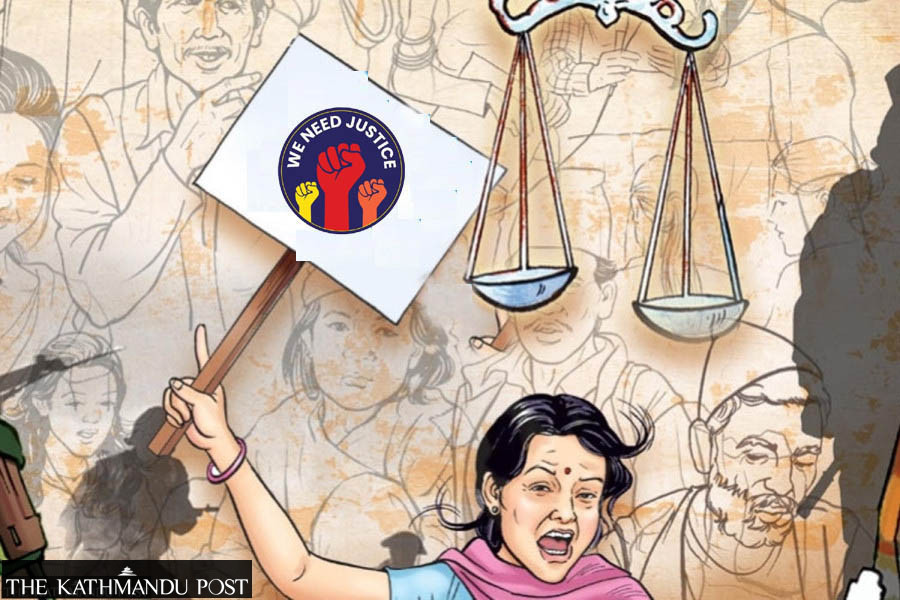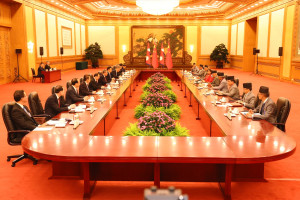National
40 individuals shortlisted for 10 posts in transitional justice bodies
The recommendation committee will ask the public for feedback on the names with a five-day deadline starting today.
Binod Ghimire
The recommendation committee to pick office bearers in two transitional justice commissions has finally shortlisted 40 individuals for the 10 positions.
It has prepared the shortlist from the applicants and selected a few on its own. Sudip Pathak, a former member of the National Human Rights Commission, Kashi Raj Dahal, former chairperson of the Administrative Court, and retired high court judges Achyut Prasad Bhandari and Dilli Raj Acharya have been shortlisted as candidates for chairpersons. Similarly, Sher Bahadur KC, a former president of the Nepal Bar Association; Bijay Sijapati, former dean of the Faculty of Law under Tribhuvan University; Bishwo Raj Koirala; and Mahesh Thapa are others shortlisted for chairpersons.
“We have shortlisted the candidates in 1:4 ratio (four candidates for one position). Eight experts have been shortlisted for two chairpersons and 32 have been shortlisted for eight member positions,” Khamma Khati, spokesperson of the recommendation committee, told the Post. “All the shortlisted candidates are very competent with expertise to lead both the commissions effectively.”
Subodh Raj Pyakurel, Birendra Thapaliya, Raju Prasad Chapagain, Tika Prasad Dhakal, Gopal Nath Yogi and Srijana Pokharel (Siwakoti) are among the 32 who have been shortlisted as members. Sangram Singh Lama, Binita Nepali, Man Bahadur Bishwokarma and Hari Shankar Karna are also in the list.
Khati said the search committee will ask the public for feedback on the names with a five-day deadline starting Saturday. The former chief justice Om Prakash Mishra-led panel might seek presentations from the shortlisted candidates before finalising the names. The KP Sharma Oli government will appoint the 10 individuals-five each, including a chairperson, for the Truth and Reconciliation Commission and the Commission of the Investigation on Enforced Disappeared Persons.
“We will recommend the names by the December 18 deadline,” said Khati.
Against the claims from the recommendation committee that they had selected the competent persons, victims from the 1996-2006 Maoist insurgency and human rights activists have objected to the names proposed for chairpersons. “We are disappointed to see the possible faces for chairpersons. It is clear that neither the political leadership nor the recommendation committee is serious about concluding the transitional justice process. They have jointly rubbed salt in the wounds of victims,” Suman Adhikari, founding chairperson of the Conflict Victims Common Platform, told the Post.
A section of the conflict victims and human rights activists had been warning against the attempts to pick candidates based on partisan interests. They had said that only credible leadership, picked through a competitive process, could handle sensitive matters like providing justice to the victims of insurgency-era atrocities.
“We have been voicing our concerns all these years about the need for credible commissions. For that office bearers must be credible and competent,” Kanak Mani Dixit, a rights activist, told the Post.
The recommendation committee had waited until the return of Prime Minister KP Sharma Oli, who is also the CPN-UML chairperson, from China before publishing the shortlist. According to sources privy to the development, Oli had held meetings with Nepali Congress President Sher Bahadur Deuba and CPN (Maoist Centre) Chairperson Pushpa Kamal Dahal on Thursday evening to discuss the names of the possible candidates.
During the meeting, Deuba had demanded his party should be allowed to select the truth commission’s chair while Dahal demanded the post of chairperson of the disappearance commission for his party. Deuba even had named Pathak for the position, according to the source. Some human rights activists have objected to his name.
The Mishra-led panel had received 156 applications from retired judges, government officials, legal experts, rights defenders, and the victims of the decade-long Maoist insurgency. However, it considered only 128 names, claiming that the remaining 28 individuals were recommended by different organisations without their personal consent. Some of the shortlisted candidates including Dahal and Sijapati, among others, had not applied themselves. Their names were included by the committee after consulting with them.
The two commissions have been defunct since July 2022, when the government extended their terms without retaining their chairmen and members. The government claimed the bill to amend the transitional justice law would be endorsed by October 2022, and the appointments would be made based on the revised Act.
However, the federal parliament took more than two years to endorse the bill. The victims and human rights defenders are now closely watching who will be appointed to the commissions.
The amended Act sets four-year terms for the two transitional justice commissions to investigate the cases and recommend prosecution and reparation. But if they fail to accomplish their tasks within the given time, they may be granted a term extension.
The truth commission has received 63,718 complaints, while the commission on disappearances is sitting on around 2,400 cases. As the recent amendment to the Act has included a provision to allocate an additional three months to collect the applications, the number will further increase.
The commissions, first formed in 2015, have done little beyond collecting complaints and conducting preliminary investigations on some cases. The to-be-formed commissions will be the third to be constituted in a decade.




 19.12°C Kathmandu
19.12°C Kathmandu













